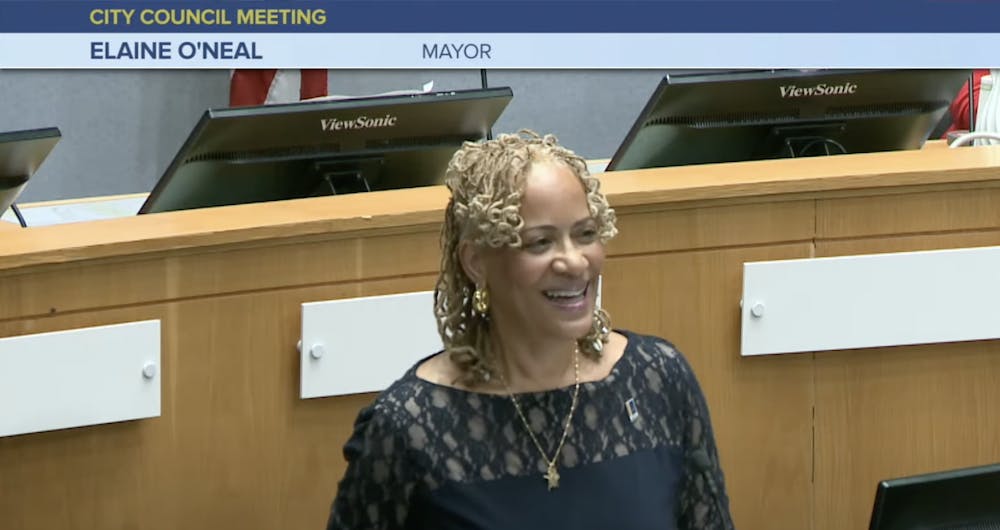After three months in office, Durham Mayor Elaine O’Neal delivered her first State of the City Address on April 18. She reflected on Durham’s previous year and shared her plans for the year ahead, focusing on the topics of safe neighborhoods, shared economic prosperity, public health and inclusivity.
Beginning the address with a metaphor, O’Neal mentioned her grandmother Cora O’Neal, who taught her how to quilt—stitching together pieces of fabric that may differ from one another. In that same vein, O’Neal hopes to create a “quilt” bringing together Durham and protecting its inhabitants with “safe neighborhoods, stable housing, well-paying jobs and quality schools.”
“Although there are many challenges ahead, I can confidently say that the state of our city is good,” O’Neal continued.
O’Neal expressed gratitude toward many people present at the address, such as City Attorney Kim Rehberg and City Clerk Diana Schreiber, as well as the other members of her city council and all of the city’s employees.
The first major issue O’Neal discussed as one of her “highest priorities” was creating safe neighborhoods: “Our city is in crisis, and gun violence has taken the lives of far too many of our relatives and our young Black men,” O’Neal said.
She said that while there is “no one solution” to Durham’s gun violence issue, there is “one path to prevention,” in which each person plays their role, whether that be law enforcement, policymakers, mental health service providers or familial and community mentors.
She welcomed six men to the stage who had been recently released from prison and reformed their lives to become business owners and community leaders.
The next major issue on O’Neal’s agenda was shared economic prosperity.
“I have been struck by the fact that there are two Main Streets in Durham,” O’Neal said. “On one end of Main Street, you see the high rises, the shops, the amenities that illustrate the leaps toward prosperity … On the other side of Main Street, you see a community that has not kept up with the prosperity.”
“Main Street—it runs through the heart of Durham. The time has come to stitch that quilt and make Durham equitable for all,” O’Neal continued.
To establish this equity, O’Neal said the city is investing in areas that have suffered due to past urban renewal policies. She pointed to Durham’s support of the partnership between the Hayti Heritage Center and the Urban Land Institute, aimed toward the redevelopment of the Fayetteville Street Corridor with a “community-centered mindset.”
Other plans to increase economic prosperity include allocating city funds toward low-cost loans to eligible local businesses and the Durham Youthworks program, which allows teenagers and young adults to gain experience with Durham’s top employers.
O’Neal said she also viewed affordable housing as an urgent issue. “We need to be bold and innovate in addressing our housing crisis,” O’Neal said. She related the issue to another priority, infrastructure, as she emphasized the need for efficient public transportation.
O’Neal then switched gears to discuss public health and the COVID-19 pandemic. She noted that transmission rates have been decreasing.
“However, we can’t take our progress for granted,” she said. “We must continually remain vigilant, follow the guidance of our local health experts and make informed decisions.”
She thanked the Duke University Health System for its “steadfast leadership.”
Finally, O’Neal advocated for making Durham a more welcoming and inclusive city overall.
“From all the other cities in the state of North Carolina, we are different,” O’Neal said, attributing this uniqueness to its diversity, particularly with growing Asian, immigrant, refugee, LGBTQ+ and Latinx populations.
“We must make Durham a safe and supportive place for everyone.”
Get The Chronicle straight to your inbox
Sign up for our weekly newsletter. Cancel at any time.

Madeleine Berger is a Trinity senior and an editor at large of The Chronicle's 119th volume.

